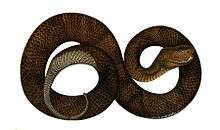Trimeresurus borneensis
Trimeresurus borneensis, commonly known as the Bornean pit viper,[4] is a venomous pit viper species endemic to the island of Borneo.[1] No subspecies are currently recognized.[3][5]
| Trimeresurus borneensis | |
|---|---|
 | |
| Scientific classification | |
| Kingdom: | Animalia |
| Phylum: | Chordata |
| Class: | Reptilia |
| Order: | Squamata |
| Suborder: | Serpentes |
| Family: | Viperidae |
| Genus: | Trimeresurus |
| Species: | T. borneensis |
| Binomial name | |
| Trimeresurus borneensis (W. Peters, 1872) | |
| Synonyms | |
Description
Scalation includes 19–21 rows of dorsal scales at midbody, 152–180 ventral scales, undivided anal scale, 45–58 divided subcaudal scales, and 8–11 supralabial scales.[4]
Its coloration varies. Individuals may be brown with darker brown saddles, or light brown with a few darker markings, or even bright yellow with darker markings.
Adults may attain 83 cm (33 in) in snout-vent length (SVL).[6]
Geographic range
Trimeresurus borneensis is found on the island of Borneo (Brunei, Kalimantan, Sabah, Sarawak) as well as in the Natuna Islands.[1]
The type locality given is "Sarawack" (= Sarawak, Borneo).[2]
Habitat
It is found in forests below an altitude of 1,130 m (3,710 ft). Even though the tail is prehensile, adults are usually on the forest floor. Juveniles may be in low vegetation.[6]
Diet
Trimeresurus borneensis preys upon small rodents and small birds.[1]
Reproduction
Whether this species of Trimeresurus lays eggs or bears live young is as yet unknown.[6]
References
- Iskandar, D.; Vogel, G.; Auliya, M.; Das, I. & Inger, R.F. (2012). "Trimeresurus borneensis". The IUCN Red List of Threatened Species. IUCN. 2012: e.T191943A2019169. doi:10.2305/IUCN.UK.2012-1.RLTS.T191943A2019169.en. Retrieved 10 January 2018.
- McDiarmid RW, Campbell JA, Touré T. 1999. Snake Species of the World: A Taxonomic and Geographic Reference, Volume 1. Herpetologists' League. 511 pp. ISBN 1-893777-00-6 (series). ISBN 1-893777-01-4 (volume).
- Trimeresurus borneensis at the Reptarium.cz Reptile Database. Accessed 28 July 2008.
- Gumprecht A, Tillack F, Orlov NL, Captain A, Ryabov S. 2004. Asian Pit vipers. GeitjeBooks Berlin. 1st Edition. 368 pp. ISBN 3-937975-00-4.
- "Trimeresurus borneensis". Integrated Taxonomic Information System. Retrieved 28 July 2008.
- Das, Indraneil. 2006. A Photographic Guide to Snakes and Other Reptiles of Borneo. Ralph Curtis Books. Sanibel Island, Florida. 144 pp. ISBN 0-88359-061-1. (Trimeresurus borneensis, p. 57.)
Further reading
- Peters, W. 1872. Übersicht der von den Herren M.se G. Doria und D.r O. Beccari in Sarawack auf Borneo von 1865 bis 1868 gesammelten Amphibien. Annali del Museo Civico di Storia Naturale di Genova, Series 1, 3: 27-45. ("Atropophis borneensis n. sp.", pp. 41–42.)
